Orthodox Bible Study Companion Series (13 vols.)
Digital Logos Edition
Overview
The Orthodox Bible Study Companion Series provides Bible commentaries written for the average layperson. Working from a literal translation of the original Greek, the commentaries examine the texts section by section, explaining their meaning in everyday language. Written from an Orthodox and patristic perspective, the series maintains a balance between the devotional and the exegetical, feeding both the heart and the mind. The series covers each of the Gospels, all of the writings of Paul, as well as the epistles of James, Peter, John, Jude, and Revelation, providing contemporary interpretations and applications drawn from Lawrence Farley’s literal translations of the Greek.
Save on the complete Ancient Faith collection when you order the Ancient Faith Biblical & Theological Studies Bundle (33 vols.). Get more resources and more savings when you bundle!

- Easily accessible biblical commentaries
- Contemporary applications and interpretations derived from literal Greek translations
- A balance of devotional and exegetical commentary
- Title: Orthodox Bible Study Companion Series
- Author: Lawrence R. Farley
- Series: Orthodox Bible Study Companion Series
- Publisher: Ancient Faith Publishing
- Volumes: 13
- Pages: 3,493
- Christian Group: Orthodox
- Resource Type: Commentaries
- Topic: Theological Systems
Individual Titles
- The Gospel of Matthew: Torah for the Church
- The Gospel of Mark: The Suffering Servant
- The Gospel of Luke: Good News for the Poor
- The Gospel of John: Beholding the Glory
- The Acts of the Apostles: Spreading the Word
- The Epistle to the Romans: A Gospel for All
- First and Second Corinthians: Straight from the Heart
- Words of Fire: The Early Epistles of St. Paul to the Thessalonians and the Galatians
- The Prison Epistles: Philippians-Ephesians-Colossians-Philemon
- Sheperding the Flock: The Pastoral Epistels of Saint Paul the Apostle to Timothy and to Titus
- The Epistle to the Hebrews: High Priest in Heaven
- Universal Truth: The Catholic Epistles of James, Peter, Jude, and John
- The Apocalypse of St. John: A Revelation of Love and Power
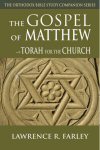
The Gospel of Matthew was written to prove to the Jews that Jesus of Nazareth is indeed the Christ, the fulfillment of their Scriptures. It contains the most thorough and organized presentation of Christ’s teaching anywhere in Scripture. Thus, the Gospel of Matthew is like the Christian Torah—the record of God’s words and deeds through Christ. Matthew’s Gospel also stresses the church, since it is the true Israel, the holy remnant, whose message is to be taken to Jews (and Gentiles) everywhere. In The Gospel of Matthew: Torah for the Church, Farley works from a literal translation of the original Greek and examines Matthew section by section, explaining its meaning in contemporary language.
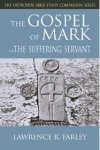
Israel expected the Messiah to be a conquering hero who would liberate the Jews from their Roman servitude. Instead, Christ came as a suffering servant to liberate all mankind from slavery to sin. The Gospel of Mark records Christ’s public ministry as both a journey to the cross and a time of vigorous action, when his miracles astounded the multitudes and his boldness infuriated his foes. In The Gospel of Mark: The Suffering Servant, Farley works from a literal translation of the original Greek and examines Mark section by section, explaining its meaning in contemporary language.
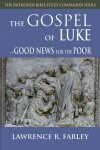
The Gospel of St. Luke was written by a gentile, for gentiles. Its purpose was to touch hearts with the good news of Christ, and it speaks especially to the poor and the marginalized of society—including women—with an emphasis on joy, healing, and prayer. Lawrence Farley expounds upon this beautiful account of the life and ministry of Christ for contemporary Christians. In The Gospel of Luke: Good News for the Poor, Farley works from a literal translation of the original Greek and examines Luke section by section, explaining its meaning in contemporary language.
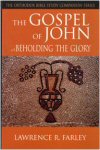
The Gospel of John strives to persuade the hearts and minds of the undecided that Jesus is the Christ, the son of God, and the only source of eternal life. St. John, as one of the 12 and a witness to Christ’s glory, sets his Gospel in a cosmic context, revealing Christ as the eternal light of God, the truth and voice of the father, the divine glory shining in the midst of men. In The Gospel of John: Beholding the Glory, Farley works from a literal translation of the original Greek and examines John section by section, explaining its meaning in contemporary language.
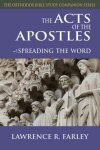
In The Acts of the Apostles: Spreading the Word, Lawrence Farley explores Acts as the sequel to Luke. He treats the book as an apology for the Christian faith as the fulfillment of Judaism, a Gospel for all peoples, a faith that poses no threat to Roman government or society, and the greatest adventure story of all time. In The Acts of the Apostles: Spreading the Word, Farley works from a literal translation of the original Greek and examines Acts section by section, explaining its meaning in contemporary language.
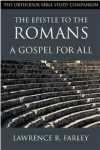
The apostle Paul lived within a swirl of controversy. False Christians—Judaizers—dogged his every step, slandering his motives, denying his apostolic authority, and seeking to overthrow his gospel teaching. They argued their case loudly, and Paul knew that he must give the literary performance of his life. The result was the Epistle to the Romans, in which he demonstrates the truth of his Gospel—a Gospel for all men—and thereby vindicates his apostolic authority. In The Epistle to the Romans: A Gospel for All, Farley works from a literal translation of the original Greek and examines Romans section by section, explaining its meaning in contemporary language.
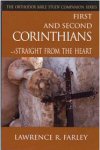
The community Paul founded in Corinth gave him both joy and grief, as he encountered disunity, sin, and arrogance including the rejection of his own apostolic authority by some of his flock. His two epistles to the Corinthians come from the heart as he appeals to them to live in peace, righteousness, and generosity, and not to resist his God-given authority. His Corinthian correspondence abides as a lasting legacy and a challenge for churches everywhere. In First and Second Corinthians: Straight from the Heart, Farley works from a literal translation of the original Greek and examines the letters to the Corinthians section by section, explaining their meaning in contemporary language.
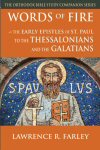
Paul’s letters to the Thessalonica and Galatia are not words of disinterested philosophy nor cold catechetical teaching. They are words of fire, burning with the love of God and his people. These early epistles have endured through the centuries to burn in our hearts as well. In Words of Fire: The Early Epistles of St. Paul to the Thessalonians and the Galatians, Farley works from a literal translation of the original Greek and examines Thessalonians and Galations section by section, explaining their meaning in contemporary language.
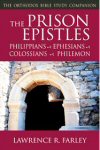
From the depths of a Roman prison, words of encouragement and instruction from Paul were sent in a series of letters to communities throughout the Roman Empire. St. Paul was shackled to Roman guards and the prisons they kept, but the word he preached remained free and full of life. In The Prison Epistles: Philippians-Ephesians-Colossians-Philemon Farley works from a literal translation of the original Greek and examines Philippians, Ephesians, Colossians, and Philemon section by section, explaining their meaning in contemporary language.
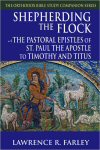
Shepherding the Flock: The Pastoral Epistles of Saint Paul the Apostle to Timothy and to Titus
- Author: Lawrence R. Farley
- Series: Orthodox Bible Study Companion Series
- Publisher: Ancient Faith Publishing
- Publication Date: 2008
- Pages: 144
St. Paul’s epistles to Timothy and Titus contain the apostle’s instructions to the pastors under his care about how they should care for their flocks in wisdom and love. As the last epistles St. Paul wrote in anticipation of his martyrdom, they remain a testimony to his pastoral love and an inspiration for those in the Church—both the shepherds and the flock—to walk in holiness and love. In Shepherding the Flock: The Pastoral Epistles of Saint Paul the Apostle to Timothy and to Titus Farley works from a literal translation of the original Greek and examines Paul’s letters to Timothy and Titus section by section, explaining their meaning in contemporary language.
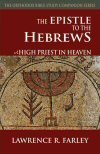
The Hebrew Christians of apostolic-era Palestine were tempted to fall back into Jewish ways because of persecution and a lack of understanding of the true significance of Christ. The writer of Hebrews exhorts them to stand fast, finish the race, and attain the promises awaiting the faithful. As part of the Orthodox Bible Study Companion Series, this commentary applies the teachings of Hebrews to our twenty-first-century lives. Orthodox archpriest Lawrence Farley balances the devotional with the intellectual, feeding both the heart and mind. Working from the original Greek, he examines Hebrews section by section and reveals its relevance for our everyday lives.
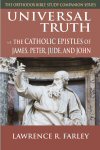
The Catholic, or general, epistles of James, Peter, Jude, and John are sometimes overshadowed by the stirring theology of the great apostle to the gentiles, St. Paul. But these seven epistles are quiet gems of instruction, encouragement, and exhortation for all believers. Written at various times and locations and to differing audiences, the general epistles nevertheless share common themes: endurance under persecution; living out the faith in a hostile society; discerning heresy by its fruits—immorality and lack of love—and resisting it, holding fast to the apostolic faith. As Farley deftly shows in his commentary, all of these are timely themes believers today can richly profit from.
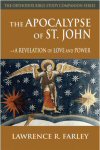
The book of Revelation has inspired controversy ever since it was written in the first century. It was the last book to be accepted into the New Testament canon, and today a myriad of mutually contradictory end-times speculations claim to be based on its teachings. Lawrence Farley provides a sober, patristic interpretation that reads Revelation in its proper context of Jewish apocalyptic literature. He demonstrates that the most important lesson we can learn from Revelation today is the need to remain faithful in a time of widespread hostility to the Christian faith.
This title is included in the following collections
You can save when you purchase this product as part of a collection.
Verbum 9 Eastern Rite Starter ...
$39.99$39.992025 Orthodox Bronze
$89.99$76.49Logos 8 Orthodox Bronze Legacy...
$89.99$89.99Verbum 8 Eastern Rite Bronze L...
$89.99$89.99
- $89.99
- $89.99
- $303.67$226.99
- $349.99$279.99
- $349.99
- $349.99
- $349.99
- $349.99
- $349.99
- $349.99
- $685.36$513.99
- $849.99$679.99
- $849.99
- $849.99
- $849.99
- $849.99
- $849.99
- $849.99
- $1,499.99$1,199.99
- $1,499.99
- $1,499.99
- $1,499.99
- $1,697.99
- $2,999.99$2,249.99
- $2,999.99
- $2,999.99
- $4,749.99$3,562.49
- $4,749.99
- $7,749.99
- $7,749.99
- $10,999.99$8,249.99
- $23,999.99$17,999.99
- $21,749.99
- $24,999.99
Archpriest Lawrence R. Farley currently pastors St. Herman of Alaska Orthodox Mission (OCA) in Langley, Canada. He received his BA from Trinity College, Toronto, and his MDiv from Wycliffe College, Toronto. A former Anglican priest, he converted to Orthodoxy in 1985 and studied for two years at St. Tikhon’s Orthodox Seminary in Pennsylvania. He has also published A Daily Calendar of Saints and gives a regular podcast called Coffee Cup Commentaries.
Reviews
1 rating

Ordice Gallups, Obl.S.B.
8/24/2018
James Michael Blackwell
11/27/2016
I am so happy that I discovered this website and Logos.com.... I believe it to be a great source of resources for the serious Christian, Orthodox, Anglican or Roman Catholic...or any Christian seriously interested in studying Christianity in a patristic light.